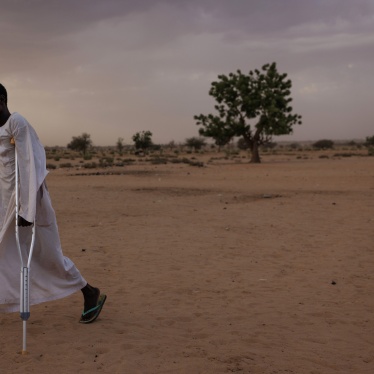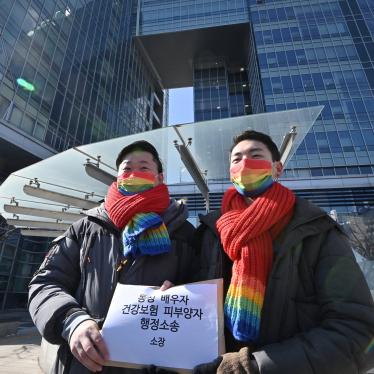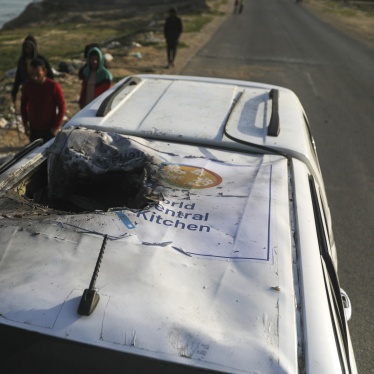His Holiness Pope John Paul II
Vatican City
Your Holiness:
I am writing on behalf of Human Rights Watch, a U.S.-based human rights organization monitoring states' compliance with international standards of human rights, in order to bring to your attention some of our concerns on the situation of human rights in Nigeria, as you prepare to make your visit to that country. We hope you will use your good offices to take up some of these fundamental issues with the military government in Nigeria during your visit.
Human Rights Watch welcomed the appeals you made to President Fidel Castro during your recent visit to Cuba, in which you asked him to release political prisoners and other prisoners on humanitarian grounds, and stressed the importance of freedom of expression and association. We note with appreciation that President Castro has in fact released some 300 prisoners following your visit. The Nigerian government also holds a large number of political prisoners, and we hope that you will take the opportunity of your visit to Nigeria to appeal for their release. An incomplete list of those currently in custody for political reasons, whether held without trial or charged (or convicted by unfair processes) for politically motivated offenses, is attached to this letter. The list undoubtedly omits the names of many people who are held for political reasons, since information is difficult to obtain especially for those held outside Lagos; and the details of some of those on the list may be incorrect, for similar reasons. We respectfully request you to raise the cases of all the detainees mentioned, inquire as to their current welfare, urge proper medical attention to be given where necessary, request permission to visit the longest-standing prisoners or those whose health is worst, and appeal for their release.
The fact that the conditions of detention in Nigeria are life-threatening was highlighted by the death of the former deputy head of state Major General Shehu Musa Yar'Adua on December 8, 1997. Yar'Adua was convicted in 1995, with about forty others, of involvement in an alleged coup plot, following a trial before a military tribunal which blatantly failed to meet international standards of due process. He was held in Abakaliki prison, where he had been intermittently taken ill for about one year before his death. On December 16, 1997, it was announced that six prisoners had died from typhoid fever in Uyo prison, Akwa Ibom State, including Patrick Usikekpo, also convicted of involvement in the 1995 coup.
Other alleged coup plotters from the 1995 trial who have recently been reported to have spent time in hospital include former head of state Gen. Olusegun Obasanjo, pro-democracy activists Dr. Beko Ransome-Kuti and Mallam Shehu Sani, and former head of army legal services Colonel Bello Fadile. The health of Beko Ransome-Kuti and Shehu Sani is particularly at risk. There are also health concerns for the four journalists convicted in the trial (Chris Anyanwu, George Mbah, Ben Charles Obi and Kunle Ajibade), and for other high profile detainees, including Chief M.K.O. Abiola and union leaders Frank Kokori and Milton Dabibi. Ebun-Olu Adegboruwa, a lawyer from the chambers of Gani Fawehinmi currently detained without charge, is reportedly very sick.
In addition, we are deeply disturbed about the general human rights situation in Nigeria, which has continued to deteriorate. We also enclose with this letter a summary of some of our current concerns about the human rights situation in Nigeria, as well as a copy of our recent report, Transition or Travesty? Nigeria's Endless Process of Return to Civilian Rule. Among the many serious human rights abuses committed by the Nigerian government against its people, the central issue is the denial of their right to choose their own government. The current "transition program" supposedly designed to restore Nigeria to elected civilian government on October 1, 1998, is wholly fraudulent. All those who criticize the program or the government are potentially subject to harassment including arbitrary and prolonged detention or even summary or arbitrary execution. The Nigerian government undermines the rule of law through the use of special tribunals, clauses excluding the courts from inquiring into the legality of executive acts, and disobedience to court orders.
We urge you to use your good offices to call on the military government in Nigeria to respect international standards relating to free political activity. In particular, the Nigerian government should appoint a genuinely independent electoral commission to implement an open and fair process of registration of political parties and screening of candidates, and should allow freedom in practice for political parties to organize, hold meetings, campaign and canvass support from voters, as well as for journalists and others to comment on the political process. The government should repeal all decrees and laws suspending the constitutional protection of fundament human rights, allowing indefinite detention without charge, preventing the courts from considering the legality of executive acts, or criminalizing peaceful criticism of the transition program or of the government.
Respectfully,
Peter Takirambudde
Executive Director, Africa Division
Human Rights Watch





